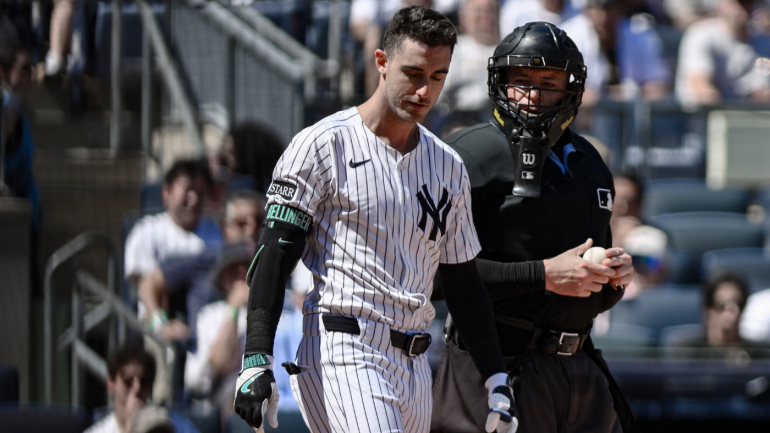
Why have Yankees been so mediocre? Breaking down flawed philosophy that is failing against strong opponents
The Yankees, now behind the Red Sox in the standings, lost three of four vs. Boston over the weekend

NEW YORK -- With each loss came an even louder silence inside the Yankees' clubhouse this past weekend. New York, which entered its four-game set against Boston holding a 1 ½-game edge over its arch rival in the American League wild card standings, was flattened for much of the weekend, dropping three straight games before salvaging the finale on Sunday night.
"I can only speak for myself, but I am definitely angry," Aaron Judge said after Saturday's 12-1 shellacking ."Especially against your rivals. You don't want to show up like that when you're at home."
The Yankees haven't shown up in a while, beating up mostly on lesser opponents. When the stage has demanded more, they've been exposed. Since June, they have a series win over just one club that is currently in playoff contention (the Mariners). New York is just 35-35 against teams over .500 and 17-22 against its division in 2025. Before Sunday's win, the Yankees dropped eight straight against the Red Sox.
"It's not acceptable," Giancarlo Stanton said. "We all know that. Boston is a good team. I mean, so are we. But, you know, you got to execute in these games. You got to execute in the division. And we haven't done that."
Why not? Let's dive deeper on the Yankees' struggles as the club tries to figure it out before October.
Flawed philosophy and sloppy play
On paper, the Red Sox shouldn't be ahead of the Yankees in the standings. Even without Gerrit Cole, New York still boasts one of the more talented rosters in baseball. Yet the Yankees have been undone by careless baserunning and defensive lapses, a pattern that was on display in the 2024 World Series and has defined more than two months of uneven play this summer. In Thursday's game, for example, Boston didn't even register a hit but still scored a run in the second inning due to three errors.
"Just not a really clean game for us," manager Aaron Boone said afterward.
Maybe the Yankees' issues run deeper. Maybe they're baked into the club's stubborn philosophy. Like a lot of teams, including the Red Sox, they've seemingly pushed fundamentals aside.
The Yankees' focus has shifted more to numbers -- metrics and data points spit out by a computer. The feel part, the eye test, seems less important.
One National League scout left shaking his head after watching their Double-A club in Somerset. A workout was obsessed with velocity. Swing hard. Throw hard. That's the drill. Put up the right numbers and maybe you'll get noticed. Maybe even earn a call-up.
Bat speed matters more than ever. But it shouldn't. Success isn't necessarily tied to how quick the bat moves to the point of contact. It's tied to timing. To quick swing decisions. To knowing your plan before the pitch is even thrown.
That's intent. That's mindset. Bat speed has its place, but it doesn't tell the story. Same with throwing hard. It's obviously a plus but not the whole picture.
For much of this season, it appears as though the Yankees have harnessed themselves to metrics, believing if those numbers show up, so will wins. That's a hard rule to live by. The Yankees have 215 home runs entering Monday night, the most in baseball and 19 more than anyone else. They have MLB's 10th-best record at 70-60.
On Friday night, the Yankees had no answers for Red Sox starter Brayan Bello, who has put together a tremendous season, carrying a 3.07 ERA through 22 starts (23 games). Bello doesn't get many strikeouts but induces weak contact at the peak of his powers with a bowling-ball sinker. New York tried to stack its lineup with a plethora of lefties against the right-hander but that failed. He challenged them with his sinker, getting them off the plate. The Yankees tried to launch the entire game, searching for that short porch in right field but wound up with either weak fly balls or grounders. The Yankees forced Bello to throw 54 pitches in three innings, but he cruised through seven, yielding just three hits in a 1-0 victory
"He was off our barrel a lot tonight," Boone said, "And had command. He was getting ahead. He was throwing strikes. It just was a case of we weren't able to square him up at all."
The Yankees avoided a sweep on Sunday as both Jazz Chisholm and Trent Grisham homered twice in a 7-2 win. Fitting, and on brand for how they've built their identity. But it came against weaker pitching. Dustin May gave up three homers. Walker Buehler, now bumped to the bullpen after flopping as a starter, surrendered the other.
Home runs aren't always there, especially in October. Pitching is better. Pressure is heavier. Teams have more time to game plan. Sometimes it comes down to execution. And the Yankees have shied away from that.
The Volpe and Boone problems
There has been a lot of focus on the routine plays Yankees shortstop Anthony Volpe has failed to make. But to make a point here, let's focus on a play Volpe did make. Go back to the first inning of Friday's contest. Max Fried induced a Trevor Story grounder to Volpe. Routine. Though Volpe records the out at first to end the frame, there is something wrong with this play.
Two things went wrong on the play, and one fed the other. First, Volpe fielded it on one knee. Then he made a throw that forced first baseman Ben Rice to dig it out of the dirt. Volpe had time to charge and work through a ball that was hit at roughly 93 miles per hour. Instead, he waited back on it.
Yet the part that stands out the most was the fact that Volpe got on one knee to field the ball. There are essentially two reasons an infielder would do this:
- The ball is hit too hard and the fielder just has to knock it down.
- The fielder just isn't confident they could, in fact, make the play.
For Volpe, it was undoubtedly the latter.
As such, his feet weren't set to make a clean throw to first base. Instead of naturally working toward first base with momentum, Volpe had to create it, ending in a throw that got Story by just a step.
Volpe's confidence at the plate and in the field currently looks shot. The Yankees haven't helped by running him out there every day.
Since his MLB debut two years ago, Volpe has ranked among the worst shortstops in baseball, both by the eye test and by metrics. He has never been sent back down to the minors, even with three options left. Now 24, maybe his ceiling in the big leagues just isn't very high. That's a real possibility. Or maybe the Yankees rushed him, letting him play only 22 games in Triple-A.
This is where the stubbornness of clubs comes into play. Teams much rather be right about a prospect, hoping that he will turn the corner, instead of sometimes putting the best product on the field. Sending Volpe down would mean the Yankees got it wrong.
They don't want to admit that.
In the dugout, Red Sox manager Alex Cora has a knack for getting the most out of his roster. He pumps confidence into platoon players and some of his hopeful budding stars still finding their way in the majors. He mixes and matches better than most, calling on the right reliever or pinch hitter when the moment calls for it. Boone, however, has been criticized for not mastering such traits.
On Friday, for example, Boone pinch-hit Stanton for Ryan McMahon against Garrett Whitlock instead of using Stanton to hit for Volpe in the eighth inning of a one-run game. Whitlock has even splits against righties and lefties. In the ninth against Aroldis Chapman, Boone stuck with the left-handed bats, Grisham and Rice, instead of turning to the right-handed Amed Rosario. Both struck out. Rice's K ended the game.
Perhaps the Yankees have what it takes to go on a run and defend their American League pennant. Perhaps their play can match their talent level against a rough September schedule that will include the Astros, Blue Jays, Tigers, and, again, the Red Sox.
Right now, though, they are just bullying bad teams until the real competition shows up.


















